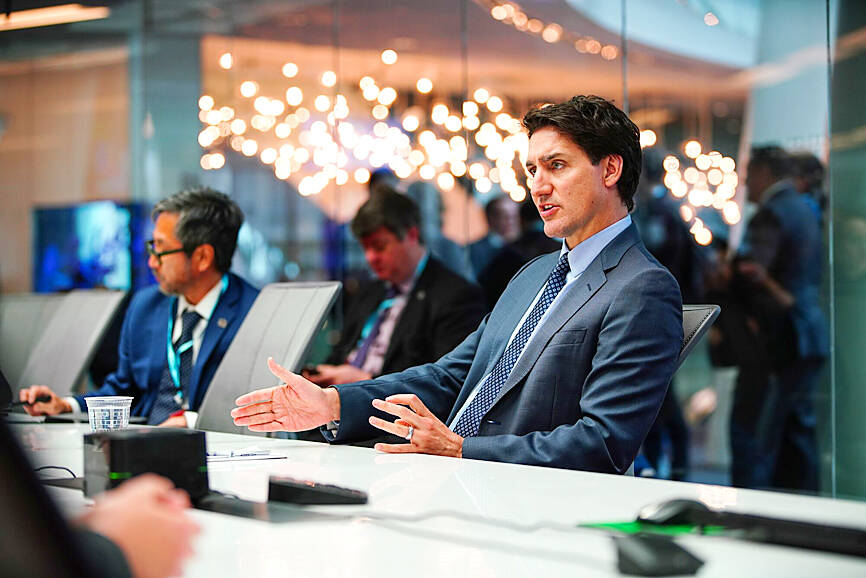Canadian Prime Minister Justin Trudeau on Friday linked the production of lithium in China to “slave labor” as he discussed his own country’s efforts to ramp up production of the metal used in electric vehicle and other batteries.
Canada has significant sources of lithium, but China has made strategic choices over the decades that have made it by far the world’s largest producer, Trudeau said.
“If we’re honest ... the lithium produced in Canada is going to be more expensive, because we don’t use slave labor,” Trudeau said in remarks at the Council on Foreign Relations think tank in New York.

Photo: Bloomberg
“Because we put forward environmental responsibility as something we actually expect to be abided by. Because we count on working with, in partnership, with Indigenous peoples, paying their living wages, expecting security and safety standards,” he said.
A representative for the Chinese embassy in Ottawa did not respond to a request for comment.
Canada last year announced a tougher policy on critical mineral investment — particularly from China — as it worked to shore up its domestic supply after the COVID-19 pandemic exposed supply chain problems.
“If the pandemic taught us anything, if the pandemic taught us anything, it’s resilience, redundancy and reliability in our supply chains,” Trudeau said.
The US has alleged use of forced labor by China in sectors including mining and construction. Last year, a US law took effect banning imports from China’s Xinjiang region over concerns about forced labor.
In December last year, the United Auto Workers union called on automakers to shift their entire supply chain out of Xinjiang after a report by Britain’s Sheffield Hallam University suggested that nearly every major automaker has significant exposure to products made with forced labor.
China denies abuses in Xinjiang, a major cotton producer that also supplies much of the world’s materials for solar panels.
Chinese firms also own, operate or finance most of the Democratic Republic of the Congo’s cobalt mines, the US Department of Labor said in a recent report.
“Our research shows that lithium-ion batteries are produced with an input — cobalt — made by child labor,” it said.
Diplomatic tensions between Canada and China have been running high since the detention of Huawei Technologies Co (華為) executive Meng Wanzhou (孟晚舟) in 2018 and Beijing’s subsequent arrest of two Canadians on spying charges.
In November, Canada ordered three Chinese companies to divest from Canadian critical minerals, citing national security. China in response accused Ottawa of using national security as a pretext and said the divestment order broke international commerce and market rules.
Other commodities:
‧ Gold for June delivery rose US$0.10 to US$1,999.10 per ounce, up 0.43 percent from a week earlier.
‧ Silver for July delivery rose US$0.02 to US$25.23 per ounce, up -0.68 percent weekly.
‧ July copper rose US$0.01 to US$3.89 per pound, down 2.26 percent.
Additional reporting by AP

GROWING OWINGS: While Luxembourg and China swapped the top three spots, the US continued to be the largest exposure for Taiwan for the 41st consecutive quarter The US remained the largest debtor nation to Taiwan’s banking sector for the 41st consecutive quarter at the end of September, after local banks’ exposure to the US market rose more than 2 percent from three months earlier, the central bank said. Exposure to the US increased to US$198.896 billion, up US$4.026 billion, or 2.07 percent, from US$194.87 billion in the previous quarter, data released by the central bank showed on Friday. Of the increase, about US$1.4 billion came from banks’ investments in securitized products and interbank loans in the US, while another US$2.6 billion stemmed from trust assets, including mutual funds,

AI TALENT: No financial details were released about the deal, in which top Groq executives, including its CEO, would join Nvidia to help advance the technology Nvidia Corp has agreed to a licensing deal with artificial intelligence (AI) start-up Groq, furthering its investments in companies connected to the AI boom and gaining the right to add a new type of technology to its products. The world’s largest publicly traded company has paid for the right to use Groq’s technology and is to integrate its chip design into future products. Some of the start-up’s executives are leaving to join Nvidia to help with that effort, the companies said. Groq would continue as an independent company with a new chief executive, it said on Wednesday in a post on its Web

Even as the US is embarked on a bitter rivalry with China over the deployment of artificial intelligence (AI), Chinese technology is quietly making inroads into the US market. Despite considerable geopolitical tensions, Chinese open-source AI models are winning over a growing number of programmers and companies in the US. These are different from the closed generative AI models that have become household names — ChatGPT-maker OpenAI or Google’s Gemini — whose inner workings are fiercely protected. In contrast, “open” models offered by many Chinese rivals, from Alibaba (阿里巴巴) to DeepSeek (深度求索), allow programmers to customize parts of the software to suit their

JOINT EFFORTS: MediaTek would partner with Denso to develop custom chips to support the car-part specialist company’s driver-assist systems in an expanding market MediaTek Inc (聯發科), the world’s largest mobile phone chip designer, yesterday said it is working closely with Japan’s Denso Corp to build a custom automotive system-on-chip (SoC) solution tailored for advanced driver-assistance systems and cockpit systems, adding another customer to its new application-specific IC (ASIC) business. This effort merges Denso’s automotive-grade safety expertise and deep vehicle integration with MediaTek’s technologies cultivated through the development of Media- Tek’s Dimensity AX, leveraging efficient, high-performance SoCs and artificial intelligence (AI) capabilities to offer a scalable, production-ready platform for next-generation driver assistance, the company said in a statement yesterday. “Through this collaboration, we are bringing two